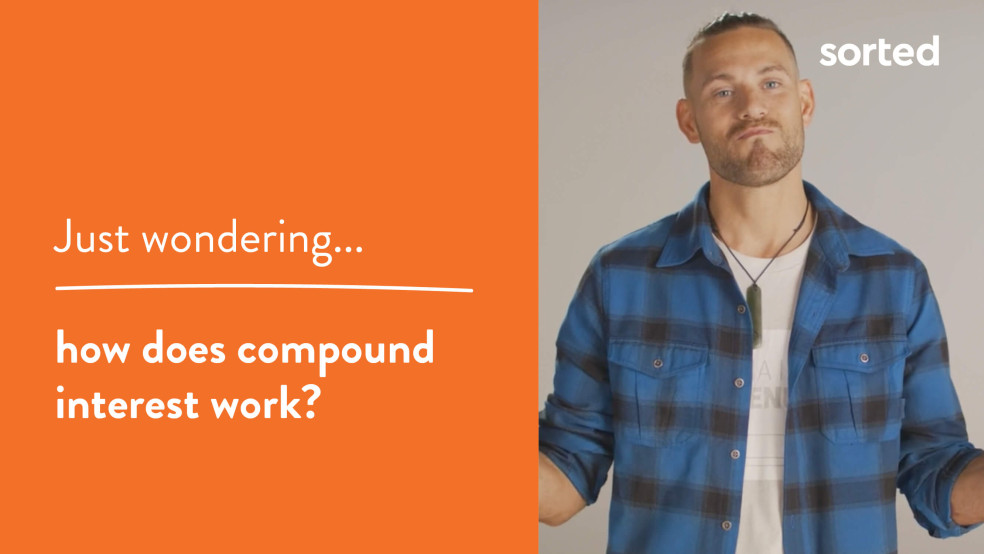
Planning & budgeting
Saving & investing
KiwiSaver
Tackling debt
Protecting wealth
Retirement
Home buying
Life events
Setting goals
Money tracking
Plan your spending with a budget
Getting advice
Studying
Get better with money
What pūtea beliefs do you have?
How to build up your emergency savings to cover unexpected costs
How to save your money
How to start investing
Find a financial adviser to help you invest
Your investment profile
Compound interest
Net worth
Types of investments
Term deposits
Bonds
Investment funds
Shares
Property investment
How KiwiSaver works and why it's worth joining
How to pick the right KiwiSaver fund
Make the most of KiwiSaver and grow your balance
How KiwiSaver can help you get into your first home
Applying for a KiwiSaver hardship withdrawal
How to use buy now pay later
What you really need to know before you use credit
How to get out of debt quickly
Credit reports
Know your rights
Pros and cons of debt consolidation
Credit cards
Car loans
Personal loans
Hire purchase
Student loans
Getting a fine
What happens if I start to struggle with moni?
How to protect yourself from fraud and being scammed
About insurance
Insurance types
Insuring ourselves
Wills
Enduring powers of attorney
Family trusts
Insuring our homes
Losing a partner
Redundancy
Serious diagnosis
How to cope with the aftermath of fraud
Separation
About NZ Super – how much is it?
When you’re thinking of living in a retirement village
How to plan, save and invest for retirement
Manage your money in retirement
Find housing options in retirement
Four approaches to spending in retirement
Planning & budgeting
Saving & investing
How to build up your emergency savings to cover unexpected costs
How to save your money
How to start investing
Find a financial adviser to help you invest
Your investment profile
Compound interest
Net worth
Types of investments
Term deposits
Bonds
Investment funds
Shares
Property investment
View all
KiwiSaver
Tackling debt
How to use buy now pay later
What you really need to know before you use credit
How to get out of debt quickly
Credit reports
Know your rights
Pros and cons of debt consolidation
Credit cards
Car loans
Personal loans
Hire purchase
Student loans
Getting a fine
What happens if I start to struggle with moni?
View all
Protecting wealth
Retirement
Home buying
Reading time: 4 minutes

Over long periods of time, compound interest supercharges your savings. The money you’re putting away is making money for you, helping you reach your goals faster.
Like a jet on a runway, it starts off flat, then takes off and climbs upward.
The money you save earns interest, which is what you are paid by the bank for holding your money. If you leave that interest in your account, it also starts earning interest of its own. Compound interest is when you earn interest on both the money you’ve saved and the interest it earns.
If you save $100 at 10% interest, after a year you have $110. The next year, your $100 earns another $10 – and the first $10 of interest also earns $1 interest of its own. So your balance grows to $121, not $120. The extra might not seem like much at first, but after three years you’ll have $133. And so on, until after 10 years your $100 has become $259 – which is $159 just from compound interest.
Compounding works for all types of investment returns, not just interest on savings in the bank. So you can have compound returns as well as compound interest.
Let’s say you invest $2000 each year (into an aggressive investment fund of mostly shares, earning the same average annual return of 5.5%). If you start at age 18 and stopped at 41 you’d see your money grow seven times to $362,562 at age 65.
If you instead wait until age 42 to start investing, you’d still have invested $48,000 over 23 years. But you would end up only doubling your money to $100,305 by age 65.

Leave in as long as possible to maximise the earning power of compounding.
Do you remember when you could get a big block of cheese for just $8? Or maybe your parents or grandparents talk about how cheap things used to be? Prices tend to increase, and they’ve gone up a fair bit through the years.
As prices inflate and things get more expensive – whether it’s food, petrol, housing or cars – our money buys less and less. That’s inflation.
Although we may have cash stashed away, it’s losing value all the time, like sand slipping through our fingers. This can make it challenging to save for long-term goals.
How can we build up enough to stay ahead of inflation?
One way is to invest so our money grows through compound returns. Ideally we want the rate of return to be higher than the rate of inflation.
Investing is the way to make the most of your money and reach your long-term goals – things that are 10 years or more in the future.
If you’d like to give this a go, check out our guide to help you get started, and our tool to work out your investor profile.
If you’re in KiwiSaver, you’re already an investor. The money we put in is invested in assets (types of investments like shares and property) managed by professionals, and the returns compound each year. This is why it works so well for long-term goals such as retirement or buying your first home.
The benefits of compounding also continue during retirement on the money you don’t withdraw straight away, helping make your money last longer.
To get an idea of what you are on track to achieve in KiwiSaver in the run up to retirement, or to see how long your money will last once you’ve stopped working, try our KiwiSaver calculator.

Find out how compound interest can make your savings grow over time by using our savings calculator.
Guide
When we buy a share, we're buying a small part of a company and a share in any profit the…

Guide
Savings accounts and term deposits with a bank, credit union or building society are convenient for saving.

Guide
Lots of New Zealanders own rental property – it has been a popular form of investment over the years. The…

Guide
Investing is all about buying things that put money back into our pockets. Sound intimidating? It’s really not. Those of…

Guide
To be successful with investing, it’s important to figure out what type of investor we are, which is sometimes called…

Guide
One of the best habits we can get into is “paying ourselves first” and making it automatic. The more we…

Guide
At Sorted, we’re keen to see you getting ahead financially and growing your money for the long term. Now generally,…

Guide
Instead of investing directly and doing it all ourselves, we can invest in a managed fund where our money is…

Guide
Simply put, net worth is the difference between the value of what we own and the total amount that we…

Guide
Everyone needs an emergency fund. When things go pear-shaped, we need to cover ourselves and those we’re closest to. That’s…

Use verification code from your authenticator app. How to use authenticator apps.
Code is invalid. Please try again
Don't have an account? Sign up
Or log in with our social media platforms


A free account gives you your very own space where you can save your tools and track your progress as you get ahead.
Or sign up using Google:



